The mostly organic solid product that can be recycled as a result of municipal wastewater treatment methods.Sewage sludge has been processed to fulfil the Part-503 land-application standards or any other equivalent land-application standards or practises, according to the National Research Council.In general, biosolids have high levels of macronutrients such as N, P, S, Ca, and Mg contained in the organic matter.
Many micronutrients critical for plant growth are also present in biosolids in various levels, including Mn, Cu, Zn, but K concentrations in biosolids are often low, and supplementary K fertiliser may be required to sustain productivity in soils receiving biosolids. On a dry-weight basis, biosolids may include 1 percent to 11 percent nitrogen and 0.7 percent to 7.5 percent phosphorus, whereas commercial fertilisers in the United States have 15 percent to 82 percent nitrogen and 8 percent to 76 percent phosphorus.Despite the fact that biosolids have lower concentrations of N and P than chemical fertilisers, the gradual release of nutrients from biosolids due to the presence of organic matter makes them suitable agronomic supplements.
THE USE OF BIOSOLIDS ON THE LAND
Since the days of the Roman Empire, animal wastes and manures have been used as a fertiliser source for agricultural crop development. Small agricultural farms in the United States and Europe during the twentieth century commonly combined crop and animal production. As a result, animal waste was organically put to the ground to boost agricultural yield. Although manures were mostly superseded by fossil fuel–based fertilisers after World War II, the practise persists today, particularly in underdeveloped countries. Since the introduction of modern wastewater treatment around 100 years ago, land application of municipal wastewater and biosolids has been performed for its good effects and for disposal purposes.The pathogen content of biosolids is split into two classes: Class A and Class B. Class A biosolids have been processed to reduce the presence of pathogens to below detectable levels and can be used at the application site without any pathogen-related restrictions.
Biosolids from Class A can also be bagged and sold to the general public. Pathogens are also treated to minimise pathogens in Class B biosolids, but measurable amounts of pathogens remain.Site limits apply to Class B biosolids to prevent the risk of human exposure until pathogen levels have been further reduced by environmental factors such as heat, sunlight, or desiccation. Class B biosolids cannot be sold, given away, or used at public areas in bags or other containers.
Biosolids are used as a soil amendment on both agricultural and non-agricultural sites because they can improve the chemical and physical qualities of soils while also providing nutrients for plant growth. Land application is used to grow food crops like maize and wheat, as well as non-food crops like cotton, on agricultural land. Forests, rangelands, public parks, golf courses, and cemeteries are examples of non-agricultural land use. Biosolids are also utilised to re-vegetate places that have been significantly disturbed, such as mine tailings or strip mines. These beneficial uses of waste can prove that waste is no more a waste if utilized in a proper way thus defending the aforesaid phrase that biosolids have a very bright side.




